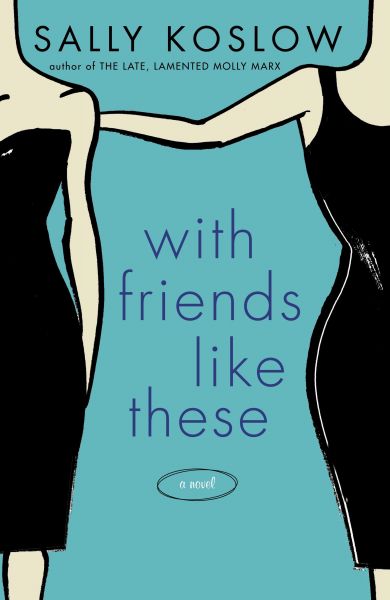 Synopsis:
Synopsis:
In the early 1990’s, Chloe, Talia, and Quincy were looking for an apartment in Manhattan. Jules de Marco had the apartment, but was looking for roommates. “I have a feeling about us,” she declared on the day they all met. “Something tells me we’re all going to be great friends.” And they were. For ten years.
But now that they are in their 30’s, life — and friendships — are more complicated.
Chloe has married Xander, a hedge fund manager, and created the perfect home for him and their son. She shares a job as a copywriter with Talia, wife of Tom, a school teacher who never seems to finish his thesis and earn his doctorate — or the salary he could command if he did, even as he eschews his own privileged upbringing.
Quincy, a free-lance writer, has suffered several miscarriages. She longs for a baby to love and a bigger, sunnier apartment in which to raise him or her with her husband, Jake, an attorney.
Only Jules has remained single. An actress, hand model, and personal shopper, she is dating Arthur, who is older, shorter, and balder than most men. He is also notoriously cheap. Neither of them appear, at least outwardly, to be interested in marriage or commitment, even though Arthur plainly adores Jules. Arthur lives in a highly desirable building, but would love to purchase a larger apartment with better views of Central Park.
Quincy confides to Jules that she desperately wants the apartment that is about to become available in the building where Arthur lives. When Jules divulges the information to Arthur, he sets out to buy the apartment, utilizing every trick he knows to thwart Quincy and Jake’s efforts.
Concerned that their financial circumstances will preclude their son, Henry, from attending the best schools and discontented with her career, Talia intercepts a call from a headhunter that is meant for Chloe, pursuing the job opportunity herself.
Review:

How well do you know yourself? How willing would you be to elevate a good friend’s needs or desires above your own?
And can you picture your life without the friends who have known you the longest and the best?
In her new novel, With Friends Like These, Sally Koslow explores those — and more — questions from the vantage points of four thirty-something women living in New York City. Koslow’s writing shows she understands that women’s relationships are complicated . . . on the best of days. With Friends Like These is a thoughtful, sometimes exasperating, but tautly paced homage to the complex, intimate, and intricate ties that bind women together.With Friends Like These can best be described as akin to a melding of two iconic television series: Sex and the City meets Thirtysomething. Like Candace Bushnell’s female foursome, the women in With Friends Like These face challenges that are unique to New Yorkers: In Manhattan, roomy apartments with streaming sunlight or picturesque views rarely become available. When they do, if the prices don’t decimate your dream of home ownership, the building association’s board members just might. And the competition for the few seats available in good schools is frequently cut-throat, with desks awarded to the highest donor. Also like Carrie, Samantha, Miranda, and Charlotte, the four protagonists in Koslow’s story have been good friends for many years. But as the story unfolds, their friendships are seriously tested, largely because of their own duplicitous and contemptuous behavior.
Seemingly casually — but, in actuality, quite deftly — Koslow sets the stage in Chapter Two for the drama that will ensue. Over lunch, Quincy tells Jules that she has found the ideal apartment. Afterward, Jules spends a couple of hours mulling over what she has learned from her friend, realizing that she wants to tell Arthur. “Was that wrong? It wasn’t illegal, and all I was going to do was share the information — and maybe, for kicks, take a peak at the place.” Before long, Jules convinces herself that she has to tell Arthur because of Quincy’s track record of having her bids on real estate rejected. Jules rationalizes breaching her friend’s confidence because she figures that Quincy will “eventually lose out on the apartment and a stranger would land this deal. I couldn’t let that happen.”
“We know not every friend is destined to be a perennial, the James Taylor or Carole King of our emotional road show. What brings a friendship to the Do Not Resuscitate point? The result depends on how bad we feel we’ve been had, whether and to what degree the evil one serves up remorse and plain old manners.”
~~ Sally Koslow
Talia is plagued by jealousy, telling herself that Chloe doesn’t deserve to get every break that comes her way. After all, from Talia’s perspective, Chloe has a fairly idyllic life: She is financially secure, with a dream home, nanny, and virtual assurance that her son will attend the best schools in Manhattan. But after Talia co-opts the career opportunity that was meant for Chloe, she finds herself wracked with guilt, mired in an ethical quagmire of her own making, and desperate to keep Chloe from finding out, lest the discovery ruin their friendship.
Chloe’s transition from a naive, trusting wife and friend to a bruised, but wiser, independent woman is the most wrenching of the four women’s journeys, but also the most realistic.
Each chapter is a first-person narrative told by one of the four women, a literary device employed by Koslow to optimal effect: The reader experiences and understands each woman’s emotions and moral dilemmas. Therein lies the strength of With Friends Like These. Absent the insight that each successive narrative gives the reader into the character’s thought processes and experiences, the book could have been just another tale of back-stabbing, self-absorbed, vacuous women. But Koslow elevates the tale by convincingly demonstrating that even the best friendships can be punctuated by jealousy, deceit, and betrayal, as well as guilt, insecurity, regret, and, ultimately, forgiveness.
Choices and living with the consequences that flow from them is a central theme that will resonate with female readers. Each character has made choices about her own life, motivated by a desire to do what’s right for herself and those she loves, and finds herself struggling with the sometimes less-than-satisfying repercussions. Now in their 30’s, each of the four female characters must accept that some of her dreams are never going to come true, and she must implement her back-up plan.
In Jules’ case, she must make a critical and time-sensitive decision, but rails and procrastinates, frozen with fear by the knowledge that no matter what she decides, her life will inarguably be forever changed.
Every one of the four characters is unique, deliciously flawed, and individually intriguing. Their conduct will, at times, literally evoke gasps of shock and revulsion, but a few pages later, the reader is just as likely to be either laughing aloud or crying along with one of the characters. In short, the four women are very realistic and empathetic because, despite their shortcomings, each woman is a loving and compassionate friend to the other three, albeit in her own imperfect manner. Each eventually recognizes that long-time friendships, if lost, can never be replaced or replicated, because the years spent getting to know each other and standing by each other’s side, can never be recaptured.
Thus, the beauty of Koslow’s work lies in the way the four women eventually come to accept each other, despite their individual and collective failings, and, for the sake of their friendships, forgive each other.
That morning the women recognized that being together was like rediscovering a pair of lost slippers. Their friendship still provided comfort that improved with time. They knew one another like a new friend never could, with a shorthand that understood when to react and when to overlook, when to boost and when to protect.
Just like real-life friends.


10 Comments
Thanks for the wonderful and detailed review of Sally’s book. I’m glad you enjoyed it. This is one that I wanted to read, but I just haven’t had the time. I hope your readers will consider picking up a copy of With Friends Like These.
All my best,
Cheryl
Superb! I think I should buy the book. The review was great and the climax was striking.
The time that we shared to our friends means a lot to us. And maybe even in the worst and the best, blissful memories shall prevail. Predicaments and failures shouldn’t be the reasons to turn our back to our dear friends. This is the best time to sit with them and listen to their sentiments.
I like the post. I’ll be reading more of the reviews in the future. Good luck!
Janie,
With yesterday the launch date for my new novel, WITH FRIENDS LIKE THESE, I could not be more grateful for your exquisitely written and thoughtful review. I appreciate that you noted its complexity, and felt that the characters were realisticly flawed.
I hope my book will find its way to many readers who will not only enjoy it, but find it a jumping-off-point for reflection and discussion on the topic of friendship.
All best,
Sally Koslow
Pingback: Tweets that mention Book Review: With Friends Like These — Colloquium -- Topsy.com
I found your site from Sprite’s Keeper. I love it. I’m going to poke around a little bit, but don’t worry I’ll put everything back where I found it!!
Sex and the City plus thirtysomething? Sounds great!
I have this one on the shelf and am really looking forward to it!!
Sounds great! The premise reminds me of “The Roommating Season” by Ronna Jaffe. I absolutely LOVED that book and have read it multiple times, so I have to check this one out!
Visiting you from the book review party!
Wonderful review, although this type of book, women friendship stories, don’t tend to appeal to me.
Hi,
this review was included at the 50th Book Review Blog Cranival at:
http://manoflabook.blogspot.com/2010/08/50th-book-review-blog-cranival.html
Pingback: The 50th Book Review Blog Carnival - Man of la Book